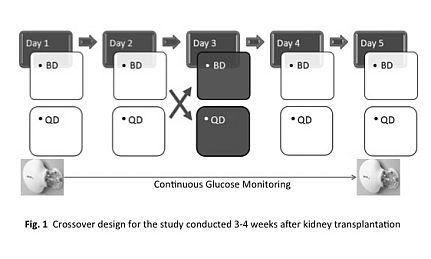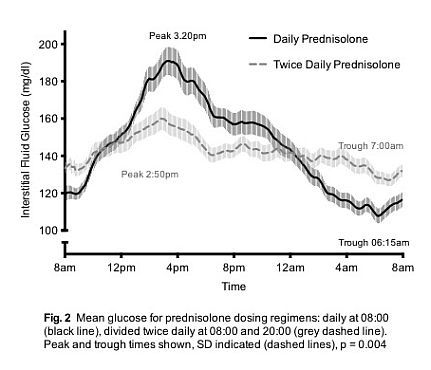Divided Daily Prednisolone Dosing Reduces Hyperglycemia after Kidney Transplantation
Medicine, University of Melbourne, Melbourne, Victoria, Australia
Nephrology, Western Hospital, Melbourne, Victoria, Australia
Epidemiology and Preventative Medicine, Monash University, Melbourne, Victoria, Australia
Diabetes and Endocrinology, Royal Melbourne Hospital, Melbourne, Victoria, Australia
Meeting: 2013 American Transplant Congress
Abstract number: D1480
The pharmacokinetics of prednisolone indicate that divided twice daily (BD) dosing would produce more even drug exposure and may improve glycemia compared with daily (QD) dosing. Therefore this study of recent kidney transplant recipients aimed to determine if BD dosing reduced hyperglycemia versus QD.
Twenty-two subjects without diabetes were randomised to BD or QD prednisolone from transplantation. In week 3, total daily dose was fixed and a continuous glucose monitor (iPro2® Medtronic) applied for 5 days (Figure 1). Subjects continued randomised regimens for Days 1-2 before crossover (Day 3) to the alternative dosing regimen for Days 4-5 (the crossover day was disregarded). Mean glucose, peak glucose (time, level), exposure hyperglycemia (AUC>140mg/dL) and Athens insomnia scale were assessed.

The mean age of subjects was 50 years and 77% were male. The median (IQR) total daily prednisolone dose was 25mg (20, 25). BD was associated with decreased glucose (mean 142 vs. 146mg/dL, p <0.0001), peak glucose (mean 191 vs. 220mg/dL, p = 0.0002), and exposure to hyperglycemia (mean 481 vs. 779mg/dL/hr, p = 0.0033). Mean time of day peak glucose occurred was 14:50h (BD) and 15:20h (QD). BD dosing did not significantly increase median (IQR) insomnia scores (median BD 4.5 (2.0, 8.3), daily 3.5 (0.8, 7.3), p = 0.11).

Compared with daily dosing, BD prednisolone reduces hyperglycemia early post-kidney transplantation. Peak glucose levels occur between 2.50-3.20pm with 8am dosing.
To cite this abstract in AMA style:
Cohney S, Fourlanos S, Colman P, Yates C. Divided Daily Prednisolone Dosing Reduces Hyperglycemia after Kidney Transplantation [abstract]. Am J Transplant. 2013; 13 (suppl 5). https://atcmeetingabstracts.com/abstract/divided-daily-prednisolone-dosing-reduces-hyperglycemia-after-kidney-transplantation/. Accessed January 8, 2026.« Back to 2013 American Transplant Congress
